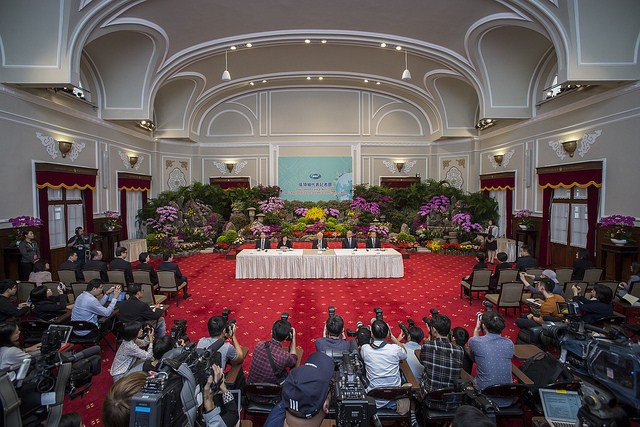News & activities
 News releases
News releases
On the morning of November 12, the Office of the President held a pre-departure press conference for the Taiwan delegation to the 26th Asia-Pacific Economic Cooperation (APEC) Economic Leaders' Week events. Leader's Representative Morris Chang (張忠謀) gave a preview of remarks he will deliver as the president's representative at the APEC Economic Leaders' Meeting on November 18 in Papua New Guinea. He then took questions from the media.
In his remarks, Dr. Chang said he was honored to accept the mission President Tsai has given him, representing her at the 26th APEC Economic Leaders' Meeting (AELM) and interacting with leaders from other countries. He emphasized that this is an economic cooperation meeting, not a political or diplomatic meeting. Leaders' representatives from 21 economic entities will participate in this year's events, and he will deliver a short speech at the meeting about the "digital economy."
Outlining the remarks he will deliver at the AELM, Dr. Chang pointed out that over the past 20 years or so, advances in information and communications technology (ICT) have changed the lives of the one billion people in APEC member nations. These advances have changed economies, consumer purchasing habits, and patterns of social interaction. Political candidates are also using new media to seek support. Although progress in ICT has spawned new businesses, it has also made many other older businesses obsolete. Advances in ICT have changed academic research methods and educational processes, and redefined what it means to be an "intellectual."
Dr. Chang said that these changes are the hallmarks of a modern digital economy, in which two factors are especially important: "innovation" and "the market economy." Innovation is the engine of the digital economy, and the market economy is the vehicle. Many APEC member economies are quite innovative, he said, including the United States, mainland China, Taiwan, Japan, Republic of Korea, and Singapore, all of which are also market economies.
Dr. Chang noted that we have already seen several problems with the digital economy, including subsidization of production capacity, lack of respect for intellectual property rights, high tariffs, and inadequate protection of privacy. Since innovation and supply chains are integral features of APEC economic entities, we urge that these problems be resolved through bilateral or multilateral negotiations. Once we have resolved problems in the current digital economy, we can move towards the digital economy of the future.
Dr. Chang pointed out that the difference between the future and current digital economy will be like the difference between today's economy and the economy of 20 or 30 years ago. In the digital economy of the future, we will see billions of devices linked together, making life more convenient and comfortable for humankind. Although it will have many advantages, the digital economy will also bring unemployment and greater income inequality, because the early adopters and creators of the future digital economy will have higher incomes. As these problems are already apparent and pose a clear and present danger to the future digital economy and social harmony, we need to find solutions.
Dr. Chang feels that government and education bear important responsibilities. Taiwan's government has already recruited economists to study how to address unemployment and income inequality, and educational institutions need to do more. The education that universities now provide is not what today's young people need. His alma mater, the Massachusetts Institute of Technology, has recently established an interdisciplinary College of Computing, which is a good start and a good model.
Dr. Chang closed his remarks by saying that fortunately, we can see both the future advantages and the problems of the digital economy. Because innovation and supply chains are integral features of APEC economic entities, and APEC is smaller than the World Trade Organization, perhaps it will be easier to undertake bilateral and multilateral discussions. Although Chinese Taipei is only a medium-sized economic entity, it is a critical and inevitable link in supply chains, and is extremely willing to engage in bilateral or multilateral discussions to resolve current or future problems.
Also present at the press conference were John C. C. Deng (鄧振中), Minister without Portfolio in the Executive Yuan; National Development Council Minister Chen Mei-ling (陳美伶); National Security Council Deputy Secretary-General Tsai Ming-yen (蔡明彥); and Deputy Foreign Minister Kelly Wu-Chiao Hsieh (謝武樵).









